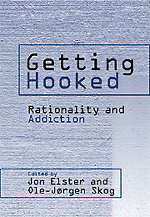Book contents
- Frontmatter
- Contents
- Preface and Acknowledgments
- Contributors
- Introduction
- Addiction and Social Interaction
- Addiction, Weakness of the Will, and Relapse
- The Dangers of Willpower
- The Neurobiology of Chemical Addiction
- To Legalize or Not to Legalize: Is That the Question?
- Rationality, Irrationality, and Addiction – Notes on Becker's and Murphy's Theory of Addiction
- Gambling and Addiction
- A Visceral Account of Addiction
- Epilogue: Rationally Coping with Lapses from Rationality
- Index
Introduction
Published online by Cambridge University Press: 05 June 2012
- Frontmatter
- Contents
- Preface and Acknowledgments
- Contributors
- Introduction
- Addiction and Social Interaction
- Addiction, Weakness of the Will, and Relapse
- The Dangers of Willpower
- The Neurobiology of Chemical Addiction
- To Legalize or Not to Legalize: Is That the Question?
- Rationality, Irrationality, and Addiction – Notes on Becker's and Murphy's Theory of Addiction
- Gambling and Addiction
- A Visceral Account of Addiction
- Epilogue: Rationally Coping with Lapses from Rationality
- Index
Summary
The Challenges of Addiction
Addictive behavior poses two great challenges. On a practical level, addiction ravages lives and communities. The challenge is to identify treatments and social policies that can reduce or eliminate this plague. On a theoretical level, addiction raises the paradox of voluntary self-destructive behavior. The challenge is to explain why people engage in behaviors that they know will harm them: Why they begin, why they persist, and why they relapse. These two tasks are clearly interrelated. To design treatments and policies that will make people quit their addictions or never become addicted in the first place, it is useful to have an understanding of the causes of addiction and relapse. Conversely, the success or failure of specific treatments and policies may confirm or falsify specific explanations of why people get addicted. Nevertheless, emphasis may fall more heavily on the practical or on the theoretical aspect.
In this book we focus mainly on the theoretical issues. At the most basic level, addiction can be seen as an instance of the classical problem of weakness of will – acting against one's own better judgment. This is the explicit theme of Olav Grjelsvik's chapter, which is organized around a confrontation between two different concepts of weakness of will and their relevance for addictive behavior. It is also the implicit theme of much of Thomas Schelling's epilogue, in which he provides an extensive analysis of the many modalities of losing control and coping with loss of control.
- Type
- Chapter
- Information
- Getting HookedRationality and Addiction, pp. 1 - 29Publisher: Cambridge University PressPrint publication year: 1999
- 4
- Cited by



